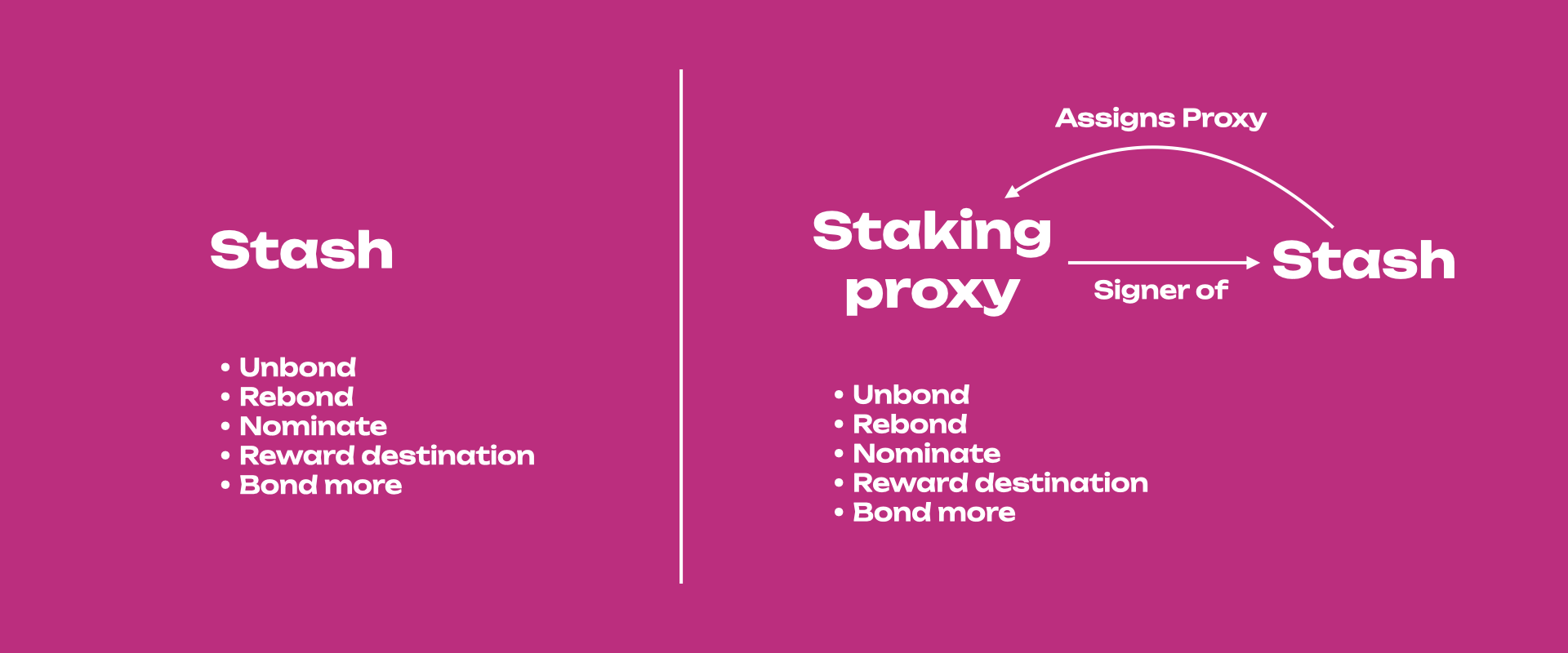Proxy Accounts
Proxies are helpful because they let you delegate efficiently and add a layer of security. Rather than using funds in a single account, smaller accounts with unique roles can complete tasks on behalf of the main stash account. Proxies can be hotter than the initial account, which can be kept cold, but the weight of the tokens in the colder account can be used by the hotter accounts. This increases the security of your accounts by minimizing the number of transactions the cold account has to make. This also drives attention away from the stash account, although it is possible to determine the relationship between the proxy and the proxied account.
From the security perspective, we can imagine proxies as bodyguards of a VIP, loyal and ready to risk their lives to ensure the VIP's protection. But proxies are also useful in other contexts such as efficient account management at the corporate level. They also provide an elegant solution to change signatories within multi-signature accounts, and they can be used within proxy calls and nested proxy calls. In this page we will explore all these interesting use cases of proxies within the Polkadot ecosystem.
Shown below is an example of how you might use these accounts. Imagine you have one stash account as your primary token-holding account and don't want to access it very often, but you want to participate in staking to earn staking rewards. You could set one of your existing accounts as a staking proxy for that stash account, and use your staking proxy to sign all staking-related transactions.

Having a staking proxy will make the stash account isolated within the staking context. In other words, the account assigned as a staking proxy can participate in staking on behalf of that stash. Without the proxy you will need to sign all the staking-related transactions with the stash. If the proxy is compromised, it doesn't have access to transfer-related transactions, so the stash account could just set a new proxy to replace it. You can also monitor proxies by setting a time-delay.
Creating multiple proxy accounts that act for a single account, lets you come up with more granular security practices around how you protect private keys while still being able to actively participate in the network.
Proxy Types
When a proxy account makes a transaction, Polkadot filters the desired transaction to ensure that the proxy account has the appropriate permission to make that transaction on behalf of the proxied account. For example, staking proxies have permission to do only staking-related transactions.
When you set a proxy, you must choose a type of proxy for the relationship with the proxied account.
- Any: allow any transaction, including balance transfers. In most cases, this should be avoided as the proxy account is used more frequently than the cold account and is therefore less secure.
- Non-transfer: allow any type of transaction except balance transfers (including vested transfers). Hence, this proxy does not have permission to access calls in the Balances and XCM pallet.
- Governance: allow to make transactions related to governance.
- Nomination pool: allow transactions pertaining to Nomination Pools.
- Staking: allow all staking-related transactions. The stash account is meant to stay in cold storage, while the staking proxy account makes day-to-day transactions like setting session keys or deciding which validators to nominate. Visit the Advanced Staking Concepts page for more detailed information about staking proxies.
- Identity Judgement: allow registrars to make judgments on an account's identity. If you are
unfamiliar with judgment and identities on chain, please refer to
this page. This proxy can only access
provide_judgementcall from the Identity pallet along with the calls from the Utility pallet. - Cancel: allow to reject and remove any time-delay proxy announcements. This proxy can only
access
reject_announcementcall from the Proxy pallet. - Spokesperson: Kusama-specific proxy type that only allows
remarkorremark_with_eventcalls. - Society: Kusama-specific proxy type that only allows society-related calls.
Proxy Deposits
Proxies require deposits in the native currency to be created. The deposit is required because adding a proxy requires some storage space on-chain, which must be replicated across every peer in the network. Due to the costly nature of this, these functions could open up the network to a Denial-of-Service attack. To defend against this attack, proxies require a deposit to be reserved while the storage space is consumed over the lifetime of the proxy. When the proxy is removed, so is the storage space, and therefore the deposit is returned.
The required deposit amount for n proxies is equal to:
ProxyDepositBase + ProxyDepositFactor * n
where the ProxyDepositBase is the required
amount to be reserved for an account to have a proxy list (creates one new item in storage). For
every proxy the account has, an additional amount defined by the
ProxyDepositFactor is reserved as well (appends
33 bytes to storage location).
Time-delayed Proxy
We can add a layer of security to proxies by giving them a delay time. The delay will be quantified in blocks. Polkadot has approximately 6 seconds of block time. A delay value of 10 will mean ten blocks, which equals about one minute delay.
The proxy will announce its intended action and will wait for the number of blocks defined in the delay time before executing it. Within this time window, the intended action may be canceled by accounts that control the proxy.
Announcing n calls using a time-delayed proxy also requires a deposit of the form:
announcementDepositBase + announcementDepositFactor * n
where the announcementDepositBase is the
required amount to be reserved for an account to announce a proxy call. For every proxy call the
account has, an additional amount defined by the
announcementDepositFactor is reserved as well.
If you are an advanced user, see the Polkadot-JS guides about proxy accounts. You can find information about creating and removing proxies, and more.